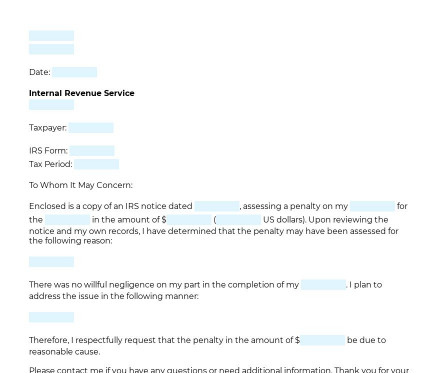IRS Penalty Response Letter Free
You can use this IRS Penalty Response letter to file a request with the IRS that a penalty levied against a taxpayer, either an individual or a business, be reduced or canceled.


 Template Overview
Template Overview
You can use this IRS Penalty Response letter to file a request with the IRS that a penalty levied against a taxpayer, either an individual or a business, be reduced or canceled. There are many reasons why tax penalties are assessed, as well as there are many reasons in place for a penalty that is not rights or too high to be reduced. The letter acts as a helper for a taxpayer to argue their case for why they believe a reduction in the amount of a penalty or a total cancelation of the penalty is justified.
You fill out a form. The document is created before your eyes as you respond to the questions.
At the end, you receive it in Word and PDF formats. You can modify it and reuse it.
 How to use this template
How to use this template
In the document, the taxpayer will have to enter all the relevant information to request for reducing the penalty. He will also have to fill out the identifying information, such as the taxpayer's name, address, and social security number. The letter defines the tax form that incurred the penalty, a copy of which is generally included with this letter to expedite the IRS review process. Finally, the taxpayer is able to specify what action they would like the IRS to take regarding the penalty.
A completed letter should be sent through verified mail, along with copies of any supporting documents.
 Applicable law
Applicable law
Depending on whether federal, state, or city taxes are the subject of this letter, taxes are governed by laws on multiple levels of government, from federal to local. Taxes are levied on income, payroll, property, sales, capital gains, dividends, imports, estates, and gifts, as well as various fees — these taxes collected by federal, state, and municipal governments. Therefore, a penalty could be the result of taxes filed with any of these entities.
Ready to build your document from this template?


 Please wait
Please wait
